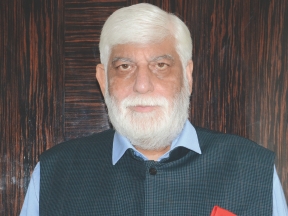Yashpal Sharma, President, Air Cargo Forum India (ACFI) shares, “The 2024 budget announcements present numerous opportunities for the Indian air cargo industry. The Indian freight forwarding community views the 2024 budget with a mixture of optimism and strategic planning, recognizing numerous initiatives that align with their aspirations for growth, efficiency, and global competitiveness. The huge allocation of 1.48 Cr crore in Skilling and Education will create a more skilled workforce bringing more efficiency to the Logistics Industry. The significant infrastructure investments will improve capacity building for all Logistics infrastructure in the country bringing further down cost of operations and quicker movement of goods. The relaxation in export-import periods for components sent for repair in the MRO industry can reduce aircraft downtime, which is beneficial for air cargo operations. Financial support for new employees and MSMEs can bolster the industry’s human resources and supply chain. E-commerce hubs and leasing support will streamline operations and increase fleet availability. Tax reductions and higher disposable incomes can stimulate demand, and industrial parks will provide advanced logistics infrastructure. Collectively, these measures are likely to drive substantial growth and development the Logistics industry, positioning it for a more competitive and dynamic future.”
Read More »‘Budget to focus on developing sustainable, transparent, digital logistics system’
KK Agarwal, CMD, CJ Darcl Logistics says, “The Union Budget 2024-25 comes with a forward-looking approach to bolster India’s logistics and infrastructure sectors. The union budget emphasised on capital expenditure of 3.4% of GDP, showcasing the government’s determination towards development of infrastructure. This significant expenditure will promote the development of new economic activity, improve transportation accessibility, and lower transportation expenses, which will support the resurgence of our country’s competitiveness. Moreover, Critical Road Connectivity projects like Patna-Purnea & Buxar-Bhagalpur Expressway along with the Industrial node at Gaya on the Amritsar – Kolkata Industrial Corridor, Sanction of twelve industrial parks under the National Industrial Corridor Development Programme, are particularly noteworthy. These initiatives will promote regional connectivity contribute to economic activities in the eastern region and epitomize the spirit of ‘Vikas bhi, Virasat bhi’. The announced reforms in the shipping industry and strategic focus on energy transition and emission targets for ‘hard to abate’ industries demonstrate the futuristic thinking balanced with the economic growth and environmental responsibility. This holistic approach aligns perfectly with our vision for a resilient, efficient, and technologically advanced logistics ecosystem. Looking ahead, we will continue to provide cooperation to the government for developing a sustainable, transparent, and digital logistics system. Together, we can position India as a global logistics powerhouse, further strengthening our sector in alignment with the ambitious goals set forth in this budget.”
Read More »‘Reduction of customs duty on gold, silver will boost its export & import’
Vipin Vohra, Chairman, Continental Carriers says, “This year’s budget focuses on nine key priorities: agriculture, employment, human development, energy security, manufacturing, innovation, infrastructure, and next-generation reforms. The rationalization and reduction of customs duty on specific commodities such as gold, silver, platinum, and mobile phones and chargers are expected to boost both their export and import. The finance minister also assured a reduction in GST slabs. The logistics industry is hopeful for exemptions or reductions in export cargo duties for air and ocean freight. To enhance industrial growth, the budget includes plans to develop industrial parks with complete infrastructure in or near 100 cities. Additionally, twelve industrial parks will be sanctioned under the National Industrial Corridor Development Programme, promoting ease of multi-modal transportation. E-Commerce Export Hubs will be set up in public private-partnership (PPP) mode. These hubs, under a seamless regulatory and logistic framework, will facilitate trade and export related services under one roof. Special emphasis on MSMEs and manufacturing sector with technology support package and reduction in TDS for e-commerce will further enhance the import/export to/from India.”
Read More »‘Allocation of Rs1.48 lakh crore for education, employment & skill is must’
Indrani Chatterjee, Group Chief Human Resources Officer (Group CHRO) at Allcargo Group says, “The budget underlines the government’s intent to strengthen one of the key pillars of Viksit Bharat, the human capital through employment, education and skilling. Allocation of Rs 1.48 lakh crore for education and employment and skill paves the way for optimising the human capital and leveraging demographic dividend. The introduction of wage subsidies for the businesses recruiting employees for the first time is a welcome move that promises to invigorate our employment landscape. Moreover, the provision of education loans with interest subvention schemes stands will build a strong future talent pipeline. Announcement of Rs. 3 trillion for programmes supporting women and girls in terms of setting up working women hostels and crèches is a welcome and timely move to enhance women participation in workforce and economic progress.”
Read More »‘Focus on infra, technology & MSMEs will drive growth’
Gregory Goba Ble, Managing Director, UPS in India says, “The Union Budget unveiled recently is a monumental stride towards positioning India as a global logistics powerhouse. It aligns seamlessly with the ‘Make in India’ initiative and lays a solid foundation for India’s future growth. This budget has hit all the right notes – focusing on infrastructure development, leveraging technology & supporting MSMEs including traditional artisans through innovative measures such as e-commerce export hubs. We commend the government’s commitment to infrastructure development, particularly the announcement of new economic corridors. These initiatives, along with strategic investments in roadways and airports, are poised to streamline logistics operations, reduce costs and enhance connectivity across key regions. The budget’s focus on MSMEs is particularly encouraging. The provision of no-collateral term loans for manufacturing MSMEs, coupled with expanded MUDRA loan limits and the new credit guarantee scheme will provide much-needed access to working capital to MSMEs. This will empower them to embrace technology and compete globally. We also applaud the government’s vision in leveraging technology through initiatives like an integrated tech platform for IBC and developing Digital Public Infrastructure. These measures are set to enhance transparency, efficiency & ease of doing business in the logistics sector. It’s also noteworthy that TDS rates have been reduced from 1% to 0.1% for e-commerce operators – this move simplifies operations while promoting growth within this rapidly expanding segment! Lastly but importantly – lower customs duties on crucial healthcare equipment & medicines demonstrate strong commitment towards improving healthcare infrastructure via efficient logistics. This budget, with its emphasis on infrastructure, technology, and support for MSMEs, charts a clear path towards a more robust, efficient, and globally competitive logistics landscape in India.”
Read More »‘Budget promises rise in investments in infra & MMLPs’
Vineet Malhotra, Co-Founder Director, Kale Logistics Solutions shares, “The 2024 Indian Union Budget brings promising developments for the logistics sector with significant investments in infrastructure and the development of multi-modal logistics parks. These initiatives will enhance connectivity, reduce transportation costs, and align with the government’s vision of a robust logistics ecosystem, fostering efficiency, upskilling the workforce, and driving economic growth. Furthermore, India’s Maritime Vision 2030 and Maritime Amrit Kaal Vision 2047 outline comprehensive initiatives to improve ports, shipping, and inland waterways, aiming to reduce vessel turnaround time and increase daily ship output. These visions reflect a commitment to growth and development in India’s coastal regions. At Kale Logistics Solutions, we are optimistic about these measures, which will undoubtedly strengthen supply chains in India.”
Read More »‘Reflects balanced approach to stimulate economic growth’
C K Govil, President, The Air Cargo Agents Association of India (ACAAI) shares, “The Indian budget reflects a balanced approach aimed at stimulating economic growth while addressing social welfare. It emphasizes infrastructure development, healthcare, and education, signaling a commitment to long-term growth. However, some critics argue that it falls short on addressing immediate economic challenges and income inequality. Overall, the budget is a mix of ambitious projects and cautious optimism, seeking to navigate India’s post-pandemic recovery.”
Read More »’12 new industrial parks & corridors will boost demand for warehousing facilities’
Amrutesh Reddy, Director, NDR InvIT Managers says, “The Union Budget 2024-2025 presents a compelling landscape for the warehousing and InvIT sectors. We see significant potential in the government’s robust infrastructure allocation of ₹11.11 lakh crore as announced in the Interim budget. The announcement of 12 new industrial parks and the focus on industrial corridors are set to boost demand for modern warehousing facilities. The budget’s emphasis on e-commerce export hubs for MSMEs and initiatives for solar panels align perfectly with evolving market needs and sustainability goals for warehousing. These measures, coupled with the push for green transition and development of essential infrastructure, create a favourable environment for InvITs to thrive. We anticipate that the government’s commitment to infrastructure financing will drive growth in our sectors. As we navigate this dynamic landscape, NDR is well-positioned to capitalize on these opportunities, delivering value to our investors while contributing to India’s infrastructure development journey.”
Read More »‘Phase 4 of PM Gram Sadak Yojana will be game changer for rural India’
Gurdeep Singh, Chairman and Founder, Jujhar Group says, “The Finance Minister’s announcement of Phase 4 of the PM Gram Sadak Yojana is a game-changer for rural India. Providing all-weather roads to 25,000 habitats will significantly enhance connectivity, ease logistics, and boost the rural economy. The proposal to develop DPI applications at a population scale for the services sector is equally transformative. It promises productivity gains, business opportunities, and innovation, particularly benefiting logistics, MSMEs, services delivery, and urban governance. This budget reflects a strategic vision that will drive sustainable growth and development across sectors.”
Read More »‘E-com export hubs will aid MSMEs in exporting local products’
Sunil Kohli, Managing Director, Rahat Cargo says, “The budget has evidently focused on infrastructure, manufacturing, and skilling which are vital for long-term development. This strategic allocation aims to establish India as a global logistics and manufacturing power centre. The budget convincingly reflects optimism about supporting innovative entrepreneurs in this ecosystem. The government’s initiative to set up e-commerce export hubs to aid MSMEs in exporting local products is considered a significant move to drive growth through innovation. It would also help accelerate exports of leather products & textiles. And the creation of industrial centres in historic hubs such as Gaya in Bihar under the ‘Vikas bhi, Virasat bhi’ scheme is expected to boost infrastructure development and subsequent creation of employment. Overall, the budget is growth oriented keeping various futuristic key factors in mind.”
Read More » Cargo Breaking News
Cargo Breaking News









